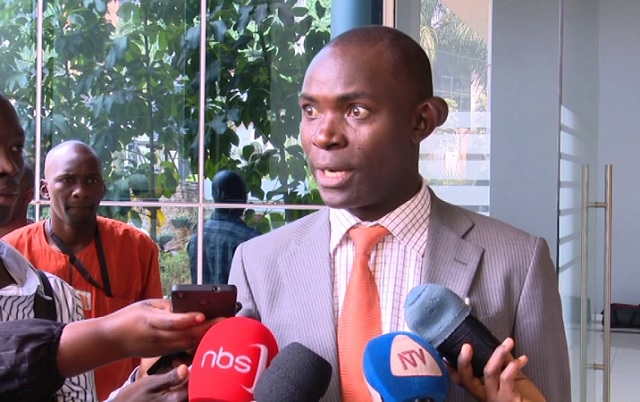The Appellate Division of the East African Court of Justice has issued timelines to be followed by the parties in the case where Kampala city lawyer Male Mabirizi (pictured above) is challenging the removal of age limit from Uganda’s Constitution.
Mabirizi started this process in 2018 when the Parliament passed the Constitutional Amendment Act, 2018 which paved way for scrapping the presidential age limits which were previously at 35 years for the lower and 75 years for the upper limit. It was later assented to by the President thereby turning into law.
But Mabirizi was not happy with the law and he first went to the Constitutional Court together with Uganda Law Society and six opposition MPs and asked for nullification of the Act on grounds that the bill which eventually led to the Constitutional Amendment Act 2018, was illegally passed. The petitioners argued that the process leading to its enactment were marred with several irregularities like violence, bribery and failure to consult the citizens.
Court also heard that the bill was sent to the Executive for assenting by the former Speaker of Parliament Rebecca Kadaga well knowing that it had errors like an invalid certificate of compliance among other grounds.
But at the Constitutional Court, majority of the judges led by the then Deputy Chief Justice Alfonse Owiny-Dollo ruled that the bill in question was passed lawfully by parliament.
However, Mabirizi together with Uganda Law Society and six opposition MPs were not satisfied with the Constitutional Court decision. They decided to petition the Supreme Court. The Supreme Court Justices also upheld the constitutional court judgment in a majority decision of the Justices led by the former Chief Justice Bart Katureebe.
Again not satisfied with this decision, Mabirizi and the six oppositions MPs petitioned the First Instance Division of the East African Court of Justice. The court later dismissed the legislators appeal before it could be heard after they failed to put in their submissions on time.
As such, Mabirizi remained alone pursuing the appeal that was later dismissed on September 30, 2020, on grounds that the actions by the three arms of government of Uganda were lawful.
The Justices led by the Principal Judge Monica Mugyenyi noted that the actions were neither in contravention of the laws of Uganda nor those of the East African Community Treaty as the appellant. The panel also condemned Mabirizi to pay costs to the government of Uganda which was represented by the former Attorney General William Byaruhanga.
However, not satisfied with the decision, Mabirizi appealed to the Appellate Division of the East African Court of Justice which yesterday started hearing the case.
In his appeal, Mabirizi argued that the panel led by the learned Principal Judge committed errors of the law when they deviated from the issues that were brought before them and determined what was not asked.
For instance, Mabirizi faults them for making findings on his character and conduct, holding that he abused court process without hearing from him on the same and failure to acknowledge and analyze the legal worth of a number of legal documents he relied on to argue his case.
Mabirizi had presented a voluminous record of documents that filled up a small pick-up truck as reference.
According to Mabirizi, the First Instance Division Judges also erred when they held that they lacked jurisdiction to entertain his complaints.
The complaints were related to the legislative processes in the Parliament of Uganda and the violence that occurred there, the pre-assent and assent steps, the processes, actions and decisions of the Constitution, Judicial fraud among others which resulted into the enactment and validation of the Uganda Constitution Amendment Act, 2018.
But when the matter came up for hearing, a five member of the Appellate Division of the East African Court Justices led by the Court President Nestor Kayobera issued the timelines via session conducted on zoom.
Other Justices on the panel are Geoffrey Kiryabwire, Vice President, Saudah Mjasiri, Kathutima M’inoti and Anita Mugeni.
These have directed the appellant Mabirizi to put in his written submissions by June 7th, 2021, the Attorney General’s team by July 6th 2021 and if there is any rejoinder it should be made by July 20th 2021.The Judges also noted that the date for making brief oral highlights will be given on notice.
The Attorney General of Uganda was represented by a team of six senior officers namely, George Kallemera the Commissioner for Civil Litigation, Phillip Mwaka, the Assistant Commissioner, Richard Adrole, Principal State Attorney, Imelda Adongo, Jackie Amusugut and Geoffrey Madete who are all senior State Attorneys.
Before giving out the timelines, the parties first agreed and framed four issues that they want determined by court.
They include; whether the First Instance Division of the East African Court of Justice committed procedural irregularities in the hearing and determination of the case and whether they also erred in law in determining that; the processes leading to the enactment of the Constitutional Amendment Act of 2018, and if the proceedings and decision in the Ugandan Constitutional Court were time barred.
The parties also want the Appellate Division to determine whether the First Instance Division of the East African Court of Justice erred in law in determining that the judicial process and decision in the Mabirizi case were in accordance with the Ugandan laws and the East African Community treaty and what remedies are available for the parties.
Asked if the case is not overtaken by events since President Yoweri Museveni whom he said was the sole beneficiary of the age limit bill was two weeks ago sworn in for the sixth term of office when he is 76 years old, Mabirizi said this is a constitutional matter and can’t be overtaken by events since the Constitution is here to stay



